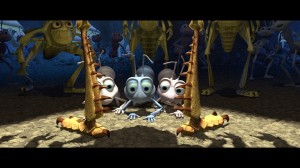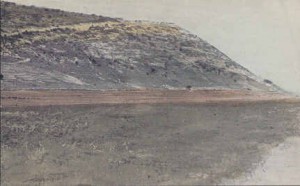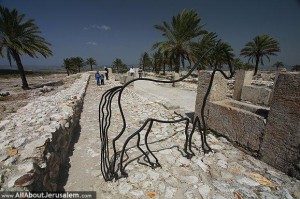On the Shabbat immediately before Purim, we read a special Maftir, which talks about the commandment to remember to wipe out Amalek. We then read a special Haftarah, the story of how King Shaul was charged with fulfilling this commandment. While we are told how he destroyed the strongholds of Amalek in Israel, the Haftarah’s mainly talks about how he lost his chance to establish a dynasty, because he allowed the people to take spoils from the war with Amalek.
We could fulfill the commandment of remembering to wipe out Amalek any Shabbat of the year, but it was established to do so on the week before Purim, due to the many connections it has to the Megilla.
Let’s start with the most familiar one:
אַחַר הַדְּבָרִים הָאֵלֶּה גִּדַּל הַמֶּלֶךְ אֲחַשְׁוֵרוֹשׁ אֶת הָמָן בֶּן הַמְּדָתָא הָאֲגָגִי
After these events, the king Achashverosh promoted Haman ben Hemdata the Agagi. (Esther 3:1)
The name of the king of Amalek that Shaul conquered in the Haftarah was Agag:
וַיִּתְפֹּשׂ אֶת אֲגַג מֶלֶךְ עֲמָלֵק חָי
He captured Agag, King of Amalek, alive (Shmuel I 15:8)
By calling Haman, “the Agagi”, the Megilla implies that he is a descendant of Amalek. He may have been literally from that nation, or only a follower of the Amaleki way of life. Either way, in Jewish lore, Haman is Amalek.
But Haman is not the only one of the protagonists of the Megilla to be found in the Haftarah:
ה) אִישׁ יְהוּדִי הָיָה בְּשׁוּשַׁן הַבִּירָה וּשְׁמוֹ מָרְדֳּכַי בֶּן יָאִיר בֶּן שִׁמְעִי בֶּן קִישׁ אִישׁ יְמִינִי:
A Jewish man lived in Shushan City, whose name was Mordechai ben Yair ben Shimi ben Kish, a Man of Binyamin. (Esther 2:5)
The hero of our Haftarah, King Shaul, is introduced as:
וַיְהִי אִישׁ מִבִּנְיָמִין וּשְׁמוֹ קִישׁ בֶּן אֲבִיאֵל בֶּן צְרוֹר בֶּן בְּכוֹרַת בֶּן אֲפִיחַ בֶּן אִישׁ יְמִינִי גִּבּוֹר חָיִל:
לוֹ הָיָה בֵן וּשְׁמוֹ שָׁאוּל…
There was a man from Binyamin, whose name was Kish ben Aviel ben Tzror ben Bchorat ben Afiach, son of a Man of Binyamin, a great warrior. He had a son named Shaul… (Shmuel I 9)
The Megilla implies that Mordechai is related to Shaul. He is certainly from the same tribe, and even from the same family, and the text goes out of its way to make that point.
Now for Esther, the heroine of the Megilla. She enters the story because the king’s advisors suggest that because Vashti refused to come when called, she should be replaced:
וּמַלְכוּתָהּ יִתֵּן הַמֶּלֶךְ לִרְעוּתָהּ הַטּוֹבָה מִמֶּנָּה
King will give her kingdom to her fellow woman who is better than her. (Esther 1:19)
In the Haftarah, the prophet Shmuel tells King Shaul that he will lose his kingdom, and be replaced:
קָרַע ה’ אֶת מַמְלְכוּת יִשְׂרָאֵל מֵעָלֶיךָ הַיּוֹם וּנְתָנָהּ לְרֵעֲךָ הַטּוֹב מִמֶּךָּ:
“Hashem tore the kingdom of Israel from you today,
and has given it to your fellow man who is better than you. (Shmuel I 15:28)
Thus, the Megilla is a “reboot” of the story of the Haftarah, with Haman cast as Agag, and the role of Shaul divided between Mordechai and Esther.
In the Haftarah, Shaul loses his power due to his misreading of the nature of the conflict with Amalek, and due to his failure to exert his authority as king. In the Megilla, Mordechai and Esther are faced with similar challenges, and overcome them, ending up with greater positions of power.
What were Shaul’s mistakes, and how do Mordechai and Esther make up for them in the “reboot”?
First, Shaul misunderstood the nature of the battle. He treated it as any other war, against any other enemy. However, the war with Amalek is not our war, it is G-d’s war. Amalek represent an ideology and a culture that is incompatible with what G-d is trying to achieve with mankind. The Torah wants us to understand this, remember it, and act on it. That is why there is a specific commandment to hear the following verses read from the Torah, at least once a year, as the Maftir of Zachor:
זָכוֹר אֵת אֲשֶׁר עָשָׂה לְךָ עֲמָלֵק בַּדֶּרֶךְ בְּצֵאתְכֶם מִמִּצְרָיִם:
אֲשֶׁר קָרְךָ בַּדֶּרֶךְ וַיְזַנֵּב בְּךָ כָּל הַנֶּחֱשָׁלִים אַחֲרֶיךָ וְאַתָּה עָיֵף וְיָגֵעַ וְלֹא יָרֵא אֱלֹהִים:
וְהָיָה בְּהָנִיחַ ה’ אֱלֹהֶיךָ לְךָ מִכָּל אֹיְבֶיךָ מִסָּבִיב בָּאָרֶץ אֲשֶׁר ה’ אֱלֹהֶיךָ נֹתֵן לְךָ נַחֲלָה לְרִשְׁתָּהּ
תִּמְחֶה אֶת זֵכֶר עֲמָלֵק מִתַּחַת הַשָּׁמָיִם לֹא תִּשְׁכָּח:
17) Remember what Amalek did to you on the road, when you left Egypt.
18) That he happened upon you on the road; he attacked those lagging at your rear,
when you were tired and exhausted; and did not fear G-d.
19) And it will be, when Hashem gives you respite from all your enemies all around,
in the land that Hashem your G-d is giving you as an inheritance, wipe out the memory of Amalek, from under the heavens; do not forget! (Devarim 25)
When the Torah describes what Amalek did, it says two things:
-
He happened upon you on the road and
- He attacked the weak at the edge of the camp.
The first refers to Amalek’s ideology, the second, to the actions that result from that ideology. Amalek believes that our world is random; things happen, there is no rhyme nor reason, all is meaningless coincidence. Life is unpredictable and cruel; the distinction between good and evil is artificial and unnecessary. The only thing that has meaning is power; raiding the weak and taking what you can is as valid way as any to succeed in life.
Hitler, who in Jewish lore is also identified with Amalek, said it very clearly:
Providence has ordained that I should be the greatest liberator of humanity. I am freeing man from the restraints of an intelligence that has taken charge, from the dirty and degrading self-mortifications of a false vision known as conscience and morality, and from the demands of a freedom and personal independence which only a very few can bear. … Conscience is a Jewish invention; it is a blemish, like circumcision (Rauschning, Hitler Speaks, p. 222).
This is why G-d is in a state of war with Amalek.
When King Shaul allowed his people to take from the spoils of Amalek, he reduced the battle to a normal war against a normal enemy, in which, as per the laws and customs of the time, the spoils belonged to the conqueror. But this war was G-d’s war, not Shaul’s. The spoils were not theirs to take.
Unlike Shaul, Mordechai and Esther understood exactly who their enemy was. When Mordechai tells Esther about Haman’s plan to kill all the Jews, he tells her:
וַיַּגֶּד לוֹ מָרְדֳּכַי אֵת כָּל אֲשֶׁר קָרָהוּ וְאֵת פָּרָשַׁת הַכֶּסֶף אֲשֶׁר אָמַר הָמָןלִשְׁקוֹל עַל גִּנְזֵי הַמֶּלֶךְ בַּיְּהוּדִים לְאַבְּדָם:
Mordechai told [Esther’s messenger] about all that had happened to him,
and about the matter of the money, that Haman had said to weigh out to the king’s treasury to destroy the Jews. (Esther 4:7)
The Midrash explicitly connects this term to the one in Parshat Zachor:
אמר להתך לך אמור לה בן בנו של קרהו בא עליכם הה”ד (דברים כ”ה) אשר קרך בדרך
He told [Esther’s messenger], “Go tell her, the grandson of “happening” has come at us, as it says, “that happened upon you on the road”. (Midrash Esther Rabbah 8)
Mordechai realized that he was not dealing with just an ordinary enemy, he was dealing with Amalek. Haman was “the grandson” of the philosophy that power is the only value, that the weak exist to be exploited, and that a conscience is a blemish upon humanity. To save the Jewish People from Amalek, all resources must be mustered, and G-d’s war must be fought.
Esther needed more convincing. Like her ancestor Shaul, her innate humility had the potential to paralyze her. She did not believe that she had the power to make a difference, and she was highly concerned about making a bad impression on the people around her:
(יא) כָּל עַבְדֵי הַמֶּלֶךְ וְעַם מְדִינוֹת הַמֶּלֶךְ יוֹדְעִים אֲשֶׁר כָּל אִישׁ וְאִשָּׁה אֲשֶׁר יָבוֹא אֶל הַמֶּלֶךְ אֶל הֶחָצֵר הַפְּנִימִית אֲשֶׁר לֹא יִקָּרֵא אַחַת דָּתוֹ לְהָמִית לְבַד מֵאֲשֶׁר יוֹשִׁיט לוֹ הַמֶּלֶךְ אֶת שַׁרְבִיט הַזָּהָב וְחָיָה וַאֲנִי לֹא נִקְרֵאתִי לָבוֹא אֶל הַמֶּלֶךְ זֶה שְׁלוֹשִׁים יוֹם:
All the king’s servants and all the members of all the king’s states know that any man or woman that comes to the king to the inner courtyard without having been summoned, the law is that they be put to death; unless the king stretches his scepter toward him. And I have not been called to come to the king for the past thirty days. (Esther 4:11)
She did not feel that she had any royal authority to exercise, no power at all that could be mustered. It was perhaps similar thinking on the part of Shaul that caused him to look the other way when the people took from the spoils of Amalek. Indeed, this is what the prophet Shmuel accuses him of:
וַיֹּאמֶר שְׁמוּאֵל הֲלוֹא אִם קָטֹן אַתָּה בְּעֵינֶיךָ רֹאשׁ שִׁבְטֵי יִשְׂרָאֵל אָתָּה
“Even if you are small in your own eyes, you are the head of the tribes of Israel!” (Shmuel I 15: 17)
Shaul let his humility interfere with his ability to act, and Esther was about to make the same mistake. At this point Mordechai takes on the additional role of the prophet Shmuel:
כִּי אִם הַחֲרֵשׁ תַּחֲרִישִׁי בָּעֵת הַזֹּאת רֶוַח וְהַצָּלָה יַעֲמוֹד לַיְּהוּדִים מִמָּקוֹם אַחֵר וְאַתְּ וּבֵית אָבִיךְ תֹּאבֵדוּ וּמִי יוֹדֵעַ אִם לְעֵת כָּזֹאת הִגַּעַתְּ לַמַּלְכוּת:
If you will be silent right now, relief and salvation will come to the Jewish People from another place. But you and your father’s house will be lost. And who knows, if it were not for this moment that you became queen?” (Esther 4:14)
Mordechai understands that Esther’s nature might cause her to continue to be silent. She does not believe in her power, does not believe in herself as a queen. So Mordechai warns her of the consequences; not to the Jewish People, who will be saved some other way anyway, but to Esther herself and to “her father’s house”.
But if the Jewish People would be saved, why would Mordechai suggest that Esther and her father’s house would be lost? Would she not be included in the salvation? Why would an orphan be concerned about what will happen to “her father’s house”?
“Her father’s house” refers to Mordechai and Esther’s ultimate ancestor, Kish Ish Yemini. The loss refers to the loss of the royal dynasty, which was Shaul’s punishment for his inaction and lack of leadership. Mordechai tells Esther that she is getting a second chance. If she acts now, she can defeat Amalek. If she fails to act, the opportunity to make up for Shaul’s failure will also be lost.
Esther takes up the challenge. She has Mordechai gather the people she leads, and then:
וַיְהִי בַּיּוֹם הַשְּׁלִישִׁי וַתִּלְבַּשׁ אֶסְתֵּר מַלְכוּת
On the third day, Esther dressed herself in royalty (Esther 5:1)
Royalty, the use of power, was not an innate part of her character. But when it was necessary, she put it on as if a costume, and wielded this power to effect the salvation of her people. The kingdom of Persia was given to Esther, “the fellow one who is better than her”. In this reboot of the story, Esther does better than Shaul, and redeems the royal house of Esther and Mordechai’s ancestor, Shaul ben Kish Ish Yemini.
PDF for printing, 4 pages A4
Copyright © Kira Sirote
In memory of my father, Peter Rozenberg, z”l
לעילוי נשמת אבי מורי פנחס בן נתן נטע ז”ל
Like this:
Like Loading...




